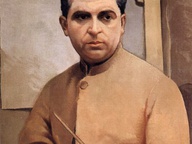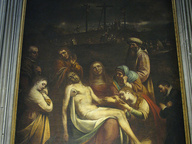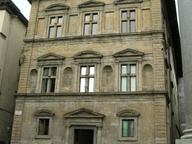Jan Dibbets. Un’altra fotografia / Another Photography
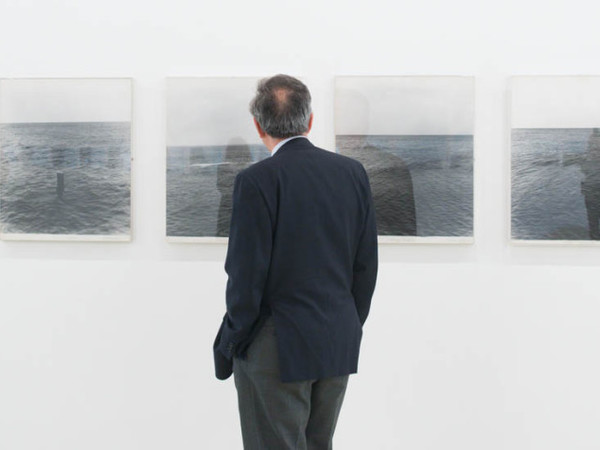
Jan Dibbets. Un’altra fotografia / Another Photography, Castello di Rivoli
From 08 Aprile 2014 to 29 Giugno 2014
Rivoli | Turin
Place: Castello di Rivoli - Museo d'Arte Contemporanea
Address: piazza Mafalda di Savoia
Times: Tuesday to Friday 10 am - 5 pm; Saturday and Sunday 10 am - 7 pm
Responsibles: Marcella Beccaria
Ticket price: full € 6,50, reduced € 4,50, free under 11
Telefono per informazioni: +39 011 9565280
E-Mail info: info@castellodirivoli.org
Official site: http://www.castellodirivoli.org/
The first major international exhibition part of the program for the thirtieth anniversary of the Castello di Rivoli starring the figure and work of Jan Dibbets, interpreter of intense international and European cultural season and one of the first artists to exhibit in the inaugural exhibition at the Museum Overture of 1984. Ordered the rooms on the third floor of the residence of the Savoy, the exhibition presents a broad and comprehensive overview of the major works of the Dutch artist from the early work of the late sixties to the present day. The exhibition, curated by Marcella Beccaria and prepared in close collaboration with the artist, presents the largest retrospective ever devoted to Dibbets in an Italian museum, including a precise selection of works particularly significant in the development of the long journey of the artist, who covers nearly fifty years of history of contemporary art. Intentionally, the selection includes works that have long been part of the permanent collection of the Castle, also favors rare works, almost unseen in public since kept in private collections for decades.
Dibbets is one of the pioneers of conceptual art of recognized importance for the generations of artists who followed him . "Rather than 'what' we see - writes Marcella Beccaria - the artist's works raise the question of 'how' we see, and it is from these fundamental questions which they originate. In dialogue with some of the highlights of Western artistic culture, painting Dutch to Italian art, and the related theories and formal perspective, the inquiring mind of Dibbets has built an innovative individual path that has contributed in turn to establish new artistic languages. Among the pioneers of Conceptual Art , and part of the beginnings of Land Art and Arte Povera, from the late sixties Dibbets was among the first to identify a use of photography as a means of "thinking", making a revolution whose consequences are further amplified in this digital age".
Jan Dibbets. Another photography / Photography Another opens with works that use the image of the horizon to investigate new possibilities of photography and visual illusions related to its two-dimensional plane. Daily but intangible element , the horizon is the starting point for the artist to develop their own specific mode of vision and construction of new visual space, cultural and philosophical. Visitors are greeted at the entrance of the exhibition, with a double video projection Horizon - Sea III, 1971, and related studies carried out at the time, as well as other works that are rarely shown in public as Five Island Trip, 1969 Sea - Horizon 1971. Additional research stems from the observation that Dibbets horizon are set up in the next room 34, where they are including historical works such as Flood Tide, 1969 Sea - Horizon 0 ° - 135 °, 1972. Belonging to the collection of the Castle Comet Land / Sky / Land , 6 th - 72 th, 1973, as part of the important series Comets series in which the artist composed the photographic image , installing the resulting photographs into dynamic compositions arc. Also belonging to the collection of the Museum is the most recent Horizon Land - Sea of 2007.
For the first time presented to the Italian public are a number of rare works on paper relating to the first Perspective Corrections, the series that reason is regarded as crucial for the formulation of conceptual art.
The exhibition continues in the dining room with 35 works that manifest the attention of Dibbets for photography investigated in relation to the effects of light, analyzing the transformations that the camera is able or not to return , as in The Shortest Day at My House in Amsterdam in 1970, the Shortest Day of 1970 Photographed from Sunrise to Sunset , Guggenheim Museum, New York , 1971 , or Daylight - Flashlight . Outside Light - Light Inside , 1971, as regards changes in the sequence of images of natural light and flash , built in Turin . Always realized in Turin , proper in the premises of the historic Galleria Sperone , is Shadows on the Floor of the Sperone Gallery, 1971 where Dibbets focuses on shapes drawn by the light on the floor. Windows appear more than once in later works such as Tollebeek in Spring II , 2000, or Santa Creus, 1994 Tilburg III (Green) , 1999 selected for the exhibition .
The New Colorstudies that are placed in room 36 , are a very important group of works that come to this and that originate from negatives taken between 1975 and 1976 , when Dibbets decided to focus its attention on details of car bodies and their colorful reflections.
The trials are a constant in Dibbets , and multiple ways to photograph are collected in room 37. Never previously exhibited in a group, the Double Dutch Mountainscompongono " views" photos of great refinement. Also rare are the works of the series The Voyage of Captain SEH 1976 early example of photography "appropriate" . LePerspective Collection, represent instead the ability to reformulate Dibbets , according to new premises, artistic questions the basis of his conceptual research .
By selecting 38 installed in the hall , the exhibition also focuses on the rich production of Dibbets eighties , when reintroduces the use of painting and uses it to juxtapose photography and painting in works that explore the perception of space from buildings or their architectural details. In the first example , the introduction of painting regards works inspired by the Italian artist's residence in Tuscany , such as San Casciano Ceiling , 1980 or monumental San Casciano Tryptich , 1983-1984 . Among the works that complement the exhibition , the Kröller Müller Saenredam II 1987 also testifies to the enduring relationship Dibbets with the great Dutch artist Saenredam and its famous church interiors , whose visual accuracy Dibbets sometimes chose to be inspired .
Dibbets is one of the pioneers of conceptual art of recognized importance for the generations of artists who followed him . "Rather than 'what' we see - writes Marcella Beccaria - the artist's works raise the question of 'how' we see, and it is from these fundamental questions which they originate. In dialogue with some of the highlights of Western artistic culture, painting Dutch to Italian art, and the related theories and formal perspective, the inquiring mind of Dibbets has built an innovative individual path that has contributed in turn to establish new artistic languages. Among the pioneers of Conceptual Art , and part of the beginnings of Land Art and Arte Povera, from the late sixties Dibbets was among the first to identify a use of photography as a means of "thinking", making a revolution whose consequences are further amplified in this digital age".
Jan Dibbets. Another photography / Photography Another opens with works that use the image of the horizon to investigate new possibilities of photography and visual illusions related to its two-dimensional plane. Daily but intangible element , the horizon is the starting point for the artist to develop their own specific mode of vision and construction of new visual space, cultural and philosophical. Visitors are greeted at the entrance of the exhibition, with a double video projection Horizon - Sea III, 1971, and related studies carried out at the time, as well as other works that are rarely shown in public as Five Island Trip, 1969 Sea - Horizon 1971. Additional research stems from the observation that Dibbets horizon are set up in the next room 34, where they are including historical works such as Flood Tide, 1969 Sea - Horizon 0 ° - 135 °, 1972. Belonging to the collection of the Castle Comet Land / Sky / Land , 6 th - 72 th, 1973, as part of the important series Comets series in which the artist composed the photographic image , installing the resulting photographs into dynamic compositions arc. Also belonging to the collection of the Museum is the most recent Horizon Land - Sea of 2007.
For the first time presented to the Italian public are a number of rare works on paper relating to the first Perspective Corrections, the series that reason is regarded as crucial for the formulation of conceptual art.
The exhibition continues in the dining room with 35 works that manifest the attention of Dibbets for photography investigated in relation to the effects of light, analyzing the transformations that the camera is able or not to return , as in The Shortest Day at My House in Amsterdam in 1970, the Shortest Day of 1970 Photographed from Sunrise to Sunset , Guggenheim Museum, New York , 1971 , or Daylight - Flashlight . Outside Light - Light Inside , 1971, as regards changes in the sequence of images of natural light and flash , built in Turin . Always realized in Turin , proper in the premises of the historic Galleria Sperone , is Shadows on the Floor of the Sperone Gallery, 1971 where Dibbets focuses on shapes drawn by the light on the floor. Windows appear more than once in later works such as Tollebeek in Spring II , 2000, or Santa Creus, 1994 Tilburg III (Green) , 1999 selected for the exhibition .
The New Colorstudies that are placed in room 36 , are a very important group of works that come to this and that originate from negatives taken between 1975 and 1976 , when Dibbets decided to focus its attention on details of car bodies and their colorful reflections.
The trials are a constant in Dibbets , and multiple ways to photograph are collected in room 37. Never previously exhibited in a group, the Double Dutch Mountainscompongono " views" photos of great refinement. Also rare are the works of the series The Voyage of Captain SEH 1976 early example of photography "appropriate" . LePerspective Collection, represent instead the ability to reformulate Dibbets , according to new premises, artistic questions the basis of his conceptual research .
By selecting 38 installed in the hall , the exhibition also focuses on the rich production of Dibbets eighties , when reintroduces the use of painting and uses it to juxtapose photography and painting in works that explore the perception of space from buildings or their architectural details. In the first example , the introduction of painting regards works inspired by the Italian artist's residence in Tuscany , such as San Casciano Ceiling , 1980 or monumental San Casciano Tryptich , 1983-1984 . Among the works that complement the exhibition , the Kröller Müller Saenredam II 1987 also testifies to the enduring relationship Dibbets with the great Dutch artist Saenredam and its famous church interiors , whose visual accuracy Dibbets sometimes chose to be inspired .
SCARICA IL COMUNICATO IN PDF
COMMENTI

-
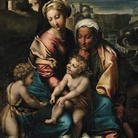 Dal 31 gennaio 2024 al 04 maggio 2025
Fermo | Palazzo dei Priori
Dal 31 gennaio 2024 al 04 maggio 2025
Fermo | Palazzo dei Priori
-
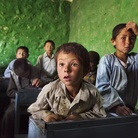 Dal 20 dicembre 2024 al 04 maggio 2025
Fermo | Palazzo dei Priori
Dal 20 dicembre 2024 al 04 maggio 2025
Fermo | Palazzo dei Priori
-
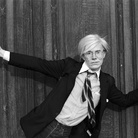 Dal 20 dicembre 2024 al 04 maggio 2024
Gorizia | Palazzo Attems Petzenstein
Dal 20 dicembre 2024 al 04 maggio 2024
Gorizia | Palazzo Attems Petzenstein
-
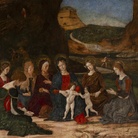 Dal 18 dicembre 2024 al 18 dicembre 2024
Venezia | Museo Correr
Dal 18 dicembre 2024 al 18 dicembre 2024
Venezia | Museo Correr
-
 Dal 14 dicembre 2024 al 02 marzo 2025
Palermo | Palazzo Abatellis
Dal 14 dicembre 2024 al 02 marzo 2025
Palermo | Palazzo Abatellis
-
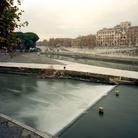 Dal 12 dicembre 2024 al 23 febbraio 2025
Roma | Palazzo Altemps
Dal 12 dicembre 2024 al 23 febbraio 2025
Roma | Palazzo Altemps
